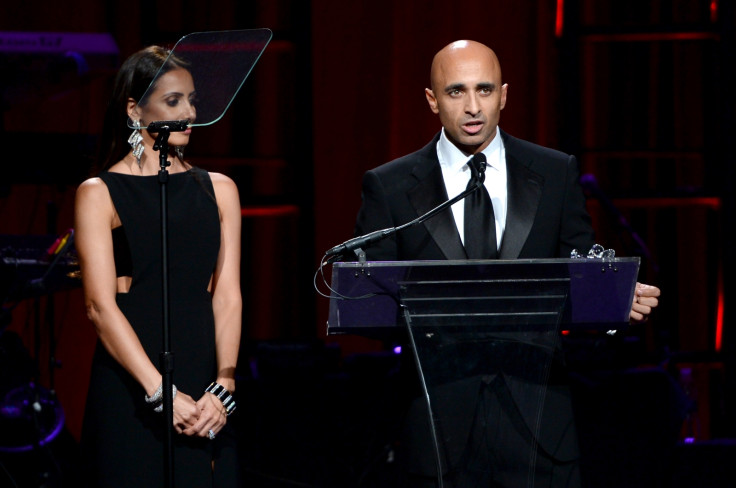Hacked emails from UAE ambassador to US reveal details of upcoming meeting with pro-Israel think tank
The perpetrators have reportedly promised to release more emails publicly.

Hackers have leaked a small trove of emails allegedly stolen from the inbox of Yousef al-Otaiba, the United Arab Emirates' ambassador to the United States, who has been dubbed "the most charming man in Washington". The emails were released to a number of media outlets including The Intercept, Huffington Post and The Daily Beast.
The perpetrators have reportedly promised to release more emails publicly.
The Intercept reported on Saturday (3 June) that the emails, released by a group that goes by the name "Global Leaks", came from the ambassador's hotmail account that he used for most official business. The documents provided included 55 pages of documents that appeared to be printed out and then recaptured by a digital camera. Some of the emails were reportedly dated as far back as 2014.
UAE embassy spokeswoman Lamiyae Jbari confirmed to The Daily Beast that the hotmail address in the emails does belong to Al Otaiba, who took up the post in July 2008. She also told the outlet: "I'm sure you're not the only one who received it."
The hackers reportedly provided The Intercept with emails, using a .ru email address that revealed an upcoming meeting between the UAE and the Foundation for Defence of Democracies (FDD), a pro-Israel, Washington-based think tank funded by billionaire Sheldon Anderson.
Although the UAE does not recognise Israel, the two nations have worked together previously against common rival Iran.
A recent email exchange between FDD CEO Mark Dubowitz, Al Otaiba and FDD Senior Counselor John Hannah had the subject line: "Target list of companies investing in Iran, UAE and Saudi Arabia."
"Dear, Mr Ambassador," Dubowitz reportedly wrote in the email dated 10 March 2017. "The attached memorandum details companies listed by country which are doing business with Iran and also have business with the UAE and Saudi Arabia. This is a target list for putting these companies to a choice, as we have discussed."
The attached memorandum included a list of "non-US businesses with operations in Saudi Arabia or UAE that are looking to invest in Iran" which listed numerous major firms such as Airbus and Lukoil.
"Presumably, the companies are being identified so that the UAE and Saudi Arabia can pressure them over investing in Iran, which is seeing an expansion of foreign investment following the 2015 nuclear deal," the Intercept reports, noting that the emails showcase a "remarkable level of backchannel cooperation" between the Gulf nation and the FDD.
In one email exchange in late April, Hannah - a former deputy national security adviser to then vice president Dick Cheney - complained to Otaiba that Qatar hosted a meeting of Hamas at an Emirati-owned hotel.
Otaiba responds saying the fault does not lie with the Emirati government, but says the real issue is the US military base in Qatar.
"How's this, you move the base then we'll move the hotel :-)", Otaiba reportedly responded.
Proposed agenda for meeting with UAE officials
The emails also detailed the proposed agenda for an upcoming meeting between UAE officials and the FBB which is scheduled for 11-14 June. Dubowitz, Hannah and VP for Research Jonathan Schanzer are listed as the FDD's attendants. Some of the senior UAE officials requested for meetings include Sheikh Mohammed Bin Zayed, Crown Prince of Abu Dhabi and Deputy Supreme Commander of the Armed Forces, as well as Sheikh Abdullah bin Zayed Al Nahyan - Minister of Foreign Affairs and International Cooperation.
Among the listed topics to be discussed are Qatar, its state-run media outlet Al Jazeera "as an instrument of regional instability and radicalisation" and possible US or UAE policies to "positively impact Iranian internal situation" and "contain and defeat Iranian aggression". Policy responses to be discussed include "political, economic, military, intelligence and cyber tools", according to the agenda.
According to HuffPost, the leakers said they aimed to "expose the UAE's efforts to manipulate the US government, and denied any allegiance to Qatar or any other government".
"As a leading Washington think tank, [the foundation] is engaged in policy discussions with a range of actors across the Middle East and elsewhere," Hannah told HuffPost in an email. "My own relationship with Ambassador Otaiba goes back years, including both my time in government and out."
However, executive director of the Arab Center Washington DC Khalil Jahshan, told Al Jazeera: "If the leaked emails are proved to be genuine, they could become a source of stress for the UAE."
IBTimes UK has reached out to the UAE embassy in Washington and Al Otaiba for comment.
The leaked emails come on the heels of the alleged Qatar news hack that exposed real tensions between the Gulf country and its neighbours. The UAE, Egypt, Saudi Arabia and Bahrain blocked access to numerous websites including Al Jazeera in response to the alleged hack. On Saturday, Bahrain's foreign minister Sheikh Khalid bin Ahmed al-Khalifa's Twitter account was briefly hacked by attackers seemingly linked with Shia militants.
© Copyright IBTimes 2025. All rights reserved.





















